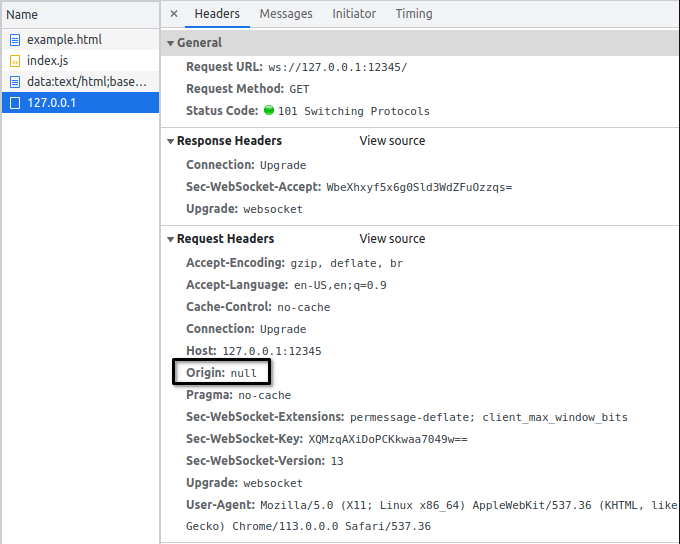Null Origin WebSocket
The purpose of this library is to permit the creation of a WebSocket client with header Origin null.
TODO and improvements
- documentation
make npm package- typescript example
Usage using npm
npm install null-origin-websocket
Brief theory behind the functioning of the library
The library, under the hood, uses an HTML iframe which content is a Javascript WebSocket Base64 encoded.
The trick of using Base64 encoding for the WebSocket, is the key to get the header Origin equals to null.
Communication between the WebSocket inside the iframe and the "outside world" (and vice versa) is done through the use of the Javascript postMessage function.
For more specific details and implementations, the source code of the library can be consulted (at the moment it's very small code base, so not difficult to find what you need to know).
Define a custom Null Origin WebSocket client
The library is made with the purpose to simplify the creation of a custom Null Origin WebSocket client by simply extending a class.
The class that must be extended is: AbstractNullOriginWebSocket
The SimpleNullOriginWebSocket is an example of custom WebSocket client created by extending the AbstractNullOriginWebSocket. It is already present in the library and it can be used for simple use cases.
For a client with advanced features, it is recommended to extend AbstractNullOriginWebSocket and implements the methods with the custom logics.
Local development
A ready to use local development env is present in dev folder.
In the index.ts there is the declaration of a WebSocket client based on SimpleNullOriginWebSocketClient.
In the ws-server.js there is a basic WebSocket server that can be used to test the client defined in index.ts.
In order to run the local development env:
# From project root folder, run webpack local http server:
npn run serve
# From dev folder, run WebSocket server:
node run ws-server.js
# After WebSocket server correctly started, the following message should appear:
The WebSocket server is running on port 12345
# Open browser on localhost:8080
# Check console/network tab of browserThen you are able to make changes on code inside src folder and see the changes in console/network browser.
Note that index.ts inside dev folder is only for testing/development purpose.
The library index.ts, that exposes the library classes, is the one inside src.
Build the library
Tools needed:
- Git
- NodeJS: v18.16.0 (tested only with this version)
To make a local build of the library:
# Clone repository locally
# From terminal, enter in the root folder of the cloned repository
# Install dependencies
npm install
# Run the build command
npm run build:libA lib folder will be created with the result of the build
Library usage example (Javascript)
Here the steps to use a build of the library in HTML file:
-
make a build of the library (see Build the library section)
-
copy the resulting
libfolder in the folder/project where you need to use the Null Origin WebSocket client -
import
lib/umd/index.jsin HTML file -
do what you need
Here an example of SimpleNullOriginWebSocket usage in HTML file:
<!DOCTYPE html>
<html lang="en">
<head>
<meta charset="UTF-8">
<meta http-equiv="X-UA-Compatible" content="IE=edge">
<meta name="viewport" content="width=device-width, initial-scale=1.0">
<title>SimpleNullOriginWebSocketClient</title>
</head>
<body>
<script src="./lib/umd/index.js"></script>
<script>
(async ()=>{
const webSocketServerUrl = "ws://127.0.0.1:12345";
const client =
new NullOriginWebSocket.SimpleNullOriginWebSocketClient(webSocketServerUrl);
client.setCustomOnMessageCallback(
(response)=>{
console.log("Handling response from custom handler");
console.log(response);
}
);
await client.establishWebSocketConnection();
})();
</script>
</body>
</html>Here a definition of a custom Null Origin WebSocket client (called MyNullOriginWebSocketClient) extending the AbstractNullOriginWebSocketClient:
<!DOCTYPE html>
<html lang="en">
<head>
<meta charset="UTF-8">
<meta http-equiv="X-UA-Compatible" content="IE=edge">
<meta name="viewport" content="width=device-width, initial-scale=1.0">
<title>MyNullOriginWebSocketClient</title>
</head>
<body>
<script src="./lib/umd/index.js"></script>
<script>
(async ()=>{
class MyNullOriginWebSocketClient extends NullOriginWebSocket.AbstractNullOriginWebSocketClient {
onopenCallback(response) {
console.log("onopen");
console.log(response);
if (this.customOnOpenCallback) {
this.customOnOpenCallback(response);
}
else {
console.warn("No custom callback defined for onopen event");
}
}
onmessageCallback(response) {
console.log("onmessage");
console.log(response);
if (this.customOnMessageCallback) {
this.customOnMessageCallback(response);
}
else {
console.warn("No custom callback defined for onmessage event");
}
}
onerrorCallback(response) {
console.log("onerror");
console.log(response);
if (this.customOnErrorCallback) {
this.customOnErrorCallback(response);
}
else {
console.warn("No custom callback defined for onerror event");
}
}
oncloseCallback(response) {
console.log("onclose");
console.log(response);
if (this.customOnCloseCallback) {
this.customOnCloseCallback(response);
}
else {
console.warn("No custom callback defined for onclose event");
}
}
constructor(url) {
super(url);
}
setCustomOnOpenCallback(callback) {
this.customOnOpenCallback = callback;
}
setCustomOnMessageCallback(callback) {
this.customOnMessageCallback = callback;
}
setCustomOnErrorCallback(callback) {
this.customOnErrorCallback = callback;
}
setCustomOnCloseCallback(callback) {
this.customOnCloseCallback = callback;
}
}
const webSocketServerUrl = "ws://127.0.0.1:12345";
const client = new MyNullOriginWebSocketClient(webSocketServerUrl);
// Set here custom callback if needed
client.setCustomOnMessageCallback(
(response)=>{
console.log("Handling response from custom handler");
console.log(response);
}
);
await client.establishWebSocketConnection();
})();
</script>
</body>
</html>
